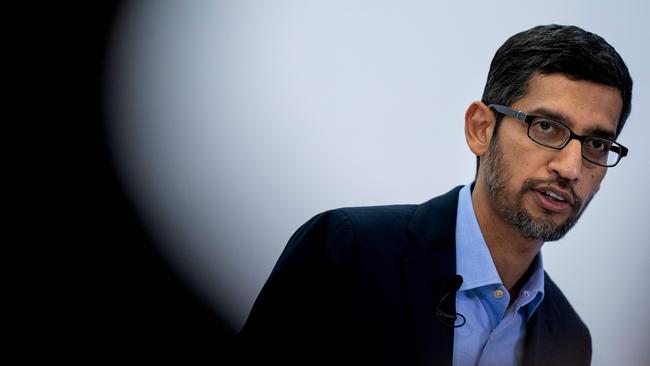Red tape and unions scare Australian companies off compulsory Covid-19 vaccinations
More US companies, including tech titans Google, Facebook and Microsoft, are mandating Covid-19 jabs but their Aussie offshoots are holding back.

Australian red tape and unions are blocking US companies from forcing workers at their Australian offshoots to be immunised against Covid-19, despite SPC becoming first local business to take such action.
More American businesses are taking a hardline approach to the unvaccinated, with CNN president Jeff Zucker firing three employers who came to work without getting the jab, to contain the spread of the highly infectious Delta-variant.
Rideshare giant Uber and Lyft are also forcing its office-based workers to get immunised - as is Google and Facebook - even Netflix is mandating US cast and crew are vaccinated. They join a growing list of companies, including Microsoft, Walmart and meatpacker Tyson Foods.
But Australian subsidiaries of US businesses are choosing to use carrots rather than sticks to lift Australia’s national vaccination rate from around 15.9 per cent to 70 per cent - the ‘magic’ number needed to avoid future lockdowns.
This is despite fruit and vegetable processor SPC this week becoming the first Australian company outside healthcare to ban unvaccinated workers. To date, no other companies have followed suit.
Instead incentives are preferred, with the country’s biggest health insurer Medibank announcing on Friday it would award its members who get vaccinated with the equivalent of a $10 gift card.
Part of the reason is the threat of industrial and legal action, as well as government policy stipulating that vaccines should be voluntary.
National cabinet has “fully agreed” to live with the virus once 70 per cent of the population is vaccinated, ensuring lockdowns will be limited to isolated occasions and cast aside once the country reaches 80 per cent.
But conjecture shrouds how the government will achieve those targets, and more companies are urging the government to mandate vaccinations for workers in some sectors as the Delta-variant locks down more than 15 million people in NSW, Victoria and Queensland.
On Friday, Prime Minister Scott Morrison has no intention of making new laws to make vaccines mandatory as he indicated rapid antigen testing will finally be used.
Mr Morrison said there will be some situations where vaccinations will be compulsory, but ultimately businesses must take their own legal advice, leaving it to courts and tribunals to decide on the matter.
Indeed, the unions are sharpening their blades for what is likely to become the biggest workplace battle in the next 12 months.
ACTU Assistant Secretary Liam O’Brien criticised SPC’s decision, which requires its workers to be fully vaccinated by November.
“Let’s be clear about what the problem is here – this is about the near impossibility for many Australians to actually get the vaccine, thanks to Scott Morrison’s failed vaccine rollout,” Mr O’Brien said.
“The union representing SPC’s workforce, the AMWU, has made it very clear that they support vaccination. (But) how can anyone be expected to get vaccinated by November when most Australians aren’t even eligible to book a vaccination appointment and are unlikely to be for many months to come.
“Unions want to see as many workers vaccinated as possible. We know that the best way to achieve this is by providing support through the provision of paid leave to access and recover from vaccination.”
That is the strategy of most Australian companies from the big banks to Telstra and Wesfarmers, the owner of Kmart, Target and Officeworks - which have all taken a softer approach to their US counterparts.
Google chief executive Sundar Pichai has told employees the company would begin requiring anyone on its US campuses to be vaccinated in the coming weeks. Google would expand that requirement to other countries in future months - but that is unlikely to include Google Australia, with a source citing Australian regulation as a roadblock, in particular Fair Work Australia policy.
It is a similar situation at Microsoft’s Australian arm. When asked about compulsory vaccination, a Microsoft Australia spokesperson said “Not yet.”
“In Australia, Microsoft is continuing to monitor local government guidance and health data closely – particularly in light of current lockdowns and restrictions across the country – and we’ll share our transition plans as and when appropriate,” the spokesperson said.
A ruling from Fair Work Ombudsman Sandra Parker says most companies can’t mandate vaccinations.
“In the current circumstances, the overwhelming majority of employers should assume that they can’t require their employees to be vaccinated against coronavirus,” she said.
“The Australian government’s policy is that receiving a vaccination is voluntary, although it aims to have as many Australians vaccinated as possible.”
Medibank chief executive David Koczkar said while “getting vaccinated is one of the keys to minimising the need for future lockdowns”, he stopped short of saying jabs should become compulsory.
Instead, Mr Koczkar said the health insurer would reward its customers who are immunised.
Eligible Medibank customers who are fully vaccinated will receive 1000 of its ‘Live Better Rewards’ points, which can be used towards gift cards or products from partners including Adidas, Amcal, Apple, Brooks, Fitbit and Onsport. Customers who are fully vaccinated will be rewarded with Live Better points to the equivalent value of a $10 Amcal gift card, Mr Koczkar said.
“With millions of Australians currently under stay at home orders due to the latest outbreak of Covid-19, it’s clear that getting vaccinated is one of the keys to minimising the need for future lockdowns,” he said.
“It’s been an incredibly tough 18 months in Australia and the personal and economic toll of this pandemic is heartbreaking.
“That’s why I would encourage all Australians eligible for the Covid-19 vaccine to join me in getting the jab.”
-Additional Reporting: Glenda Korporaal


